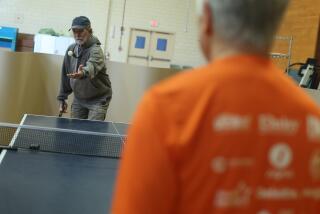An Ounce of Prevention for Rural Elderly
- Share via
COVESVILLE, Va. — In the midst of Virginia horse country, about 15 miles from Thomas Jefferson’s stately mansion, Monticello, 85-year-old James Wallace lives alone in a wooden shack with no running water.
Wallace opened a screened rabbit hutch one recent morning and pulled out the tattered papers of an insurance policy that he kept sheathed in plastic bags. He sorted the papers with trembling hands and told visitor Anita Heisterman he needs legal help because he wants to cash in the policy.
Heisterman, a nurse, can’t solve the legal problem. But she has been visiting Wallace for the last year and a half and says helping him with problems--finding him a lawyer or trying to acquire a portable toilet for his yard--benefits his overall health.
“It’s all linked together,” said Heisterman, who runs a program that aims to improve health care for low- to middle-income rural elderly in a five-county area of central Virginia.
The Jefferson Area Rural Elder Outreach Program, an experiment funded for five years by a $1.1-million grant from the W.K. Kellogg Foundation, has served about 250 older people in Albemarle, Fluvanna, Nelson, Louisa and Greene counties. The program provides the elderly with services that help them handle problems they probably could take care of on their own. It also tries to get seniors’ families involved.
The program’s future was in doubt when its grant money ran out last summer. But the Continuum Home Health Care program at the University of Virginia Medical Center recently decided to fund the program and make it part of the Continuum service.
Elderly Virginians in rural areas face many health problems elderly people in cities don’t.
Many rural elderly, especially in the South, either are neglected or placed prematurely in nursing homes, said Ivo Abraham, a University of Virginia professor of nursing and an associate professor of psychiatric medicine who launched the rural elder program.
Illiteracy is common and suicide rates are high, he said.
“Rural elderly have more illnesses,” Abraham said. “Loneliness, isolation, depression . . . is relatively common.”
In Virginia, the suicide rate among the elderly was 22 per 100,000 deaths in the early 1990s, according to statistics provided by Abraham. For the entire U.S. elderly population, it was 19.8 per 100,000 deaths. The nation’s general suicide rate was 12.6 per 100,000.
Abraham first studied outreach programs in the Midwest, but found that a rural Southern area needed a different kind of program that focused on bringing care to people such as Wallace, who have no telephones and live in isolated places.
Although every region is different, Abraham said he thinks similar programs could work in other rural areas.
The outreach program has helped improve emotional problems such as depression and stabilized participants’ physical conditions, Abraham said.
The program also can save money in the long run because it tends to reduce emergency room visits and staves off nursing home placement.
The program costs a little more than $1,000 per patient each year, plus a few thousand dollars more in social services, Abraham said. That compares with at least $29,000 per year in a nursing home.
The University of Virginia, through its schools of nursing and medicine, provides academic expertise and financial resources, while the two other partners in the program, the Region Ten Community Services Board and the Jefferson Area Board for Aging, provide mental health expertise and geriatric services.
The University of Virginia will provide about $65,000 for the program next year; about $30,000 of that will be reimbursed through Medicaid, said Barry Anderson, administrator of the Continuum Home Health Care program.
“This is a service that is needed,” Anderson said. Also, “it may indeed be more cost effective and certainly better for the patient if we can intervene early on.”
Participants have ranged in age from 51 to 103. The average age is 78, Heisterman said.
Eighty-year-old Jeannette Winfrey has participated in the program for several years.
Heisterman, who specializes in psychiatric nursing, would visit Winfrey to talk about the depression that developed after the death of Winfrey’s son. Heisterman still comes out to her home occasionally.
Winfrey doesn’t drive, and says she probably wouldn’t have sought help if she had to go about 20 miles to Charlottesville to see Heisterman.
“It meant a lot to me to know that she was coming,” Winfrey said. “She came and would sit and talk with me. It was a lot of company, really.”
More to Read
Sign up for Essential California
The most important California stories and recommendations in your inbox every morning.
You may occasionally receive promotional content from the Los Angeles Times.













